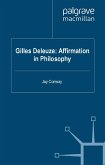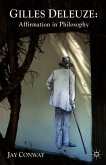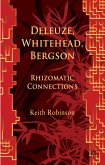Félix Guattari: Thought, Friendship, and Visionary Cartography, by Franco Berardi 'Bifo', originates in the author's close personal acquaintance with Félix Guattari's writings and political engagement in the context of Berardi Bifo's activism in Italian autonomist politics and his ongoing collaboration with Guattari in the 1970s and 1980s. This biography gains distinction from its keen insight into Guattari's political practice and from a precise understanding of how this practice relates to the theoretical and conceptual aspects of Guattari's writings, alone and with Gilles Deleuze. Thanks to an approach at once personal and theoretically well informed, Bifo's biography provides a clear and accessible introduction to Guattari's works. This edition also includes a critical introduction and a 2005 interview with Bifo on a range of topics relating Guattari's works to the current political conjuncture.
'In these stirring pages Bifo produces a rhythmic map of Félix Guattari's thought that resonates with the contemporary discords of cognitive labour. Tones of intimacy and abstraction combine in haunting chords of unhappy politics and philosophical triumphs. Strains of oracularity take flight in political insights more Buddhist than Leninist. Immensely protective of Félix as both teacher and friend, Bifo ensures that the refrains of Guattari's processes of subjectivation do not petrify into academic givens but continue to sing their extraordinary singularity and make new becomings available for those engaged in tomorrow's struggles. Bifo invites his readers to share the intensities of conceptual and political creativity, productively despair of the fragility of the psyche and the environment, and rejoice in a philosophical friendship with the conviction to head straight into chaos. Bifo's Félix is a netizen before the letter; semio-chemist of molecular evolution; analyst of anunconscious redesigned for getting things done together; and a trusted fellow militant. In this remarkable book there is more than enough sharable affect available to counteract the attenuations of revolutionary desire under infocapital.' - Gary Genosko, Canada Research Chair in Technoculture, Lakehead University
'Félix Guattari was the bridge between French poststructuralism and Italian autonomism, the thinker and militant who, more than anyone else, made possible the synthesis of thosecurrents that now looms so large in debates over globalization, network culture and cognitive capitalism. Franco 'Bifo' Berardi is a major Italian media theorist and activist, an agent provocateur who deserves to be as well known to Anglophone readers as Agamben, Negri or Vattimo. Bifo's book does many things at once: it introduces readers to the thought of Guattari (and Deleuze, who for once gets second billing) in a lively and agile manner; it offers a moving tribute to a departed friend and ally as well as a meditation on friendship as the necessary condition of thought and action; it creates new philosophical concepts of unhappiness and depression that are crucial for understanding the present; and much more. This book should be essential reading for everyone who is concerned with nihilism and deconstruction, biopower and the multitude, bare life and the state of exception in short, everyone who wants to confront the twenty-first century on its own terms.' - Timothy S. Murphy, University of Oklahoma
'Félix Guattari was the bridge between French poststructuralism and Italian autonomism, the thinker and militant who, more than anyone else, made possible the synthesis of thosecurrents that now looms so large in debates over globalization, network culture and cognitive capitalism. Franco 'Bifo' Berardi is a major Italian media theorist and activist, an agent provocateur who deserves to be as well known to Anglophone readers as Agamben, Negri or Vattimo. Bifo's book does many things at once: it introduces readers to the thought of Guattari (and Deleuze, who for once gets second billing) in a lively and agile manner; it offers a moving tribute to a departed friend and ally as well as a meditation on friendship as the necessary condition of thought and action; it creates new philosophical concepts of unhappiness and depression that are crucial for understanding the present; and much more. This book should be essential reading for everyone who is concerned with nihilism and deconstruction, biopower and the multitude, bare life and the state of exception in short, everyone who wants to confront the twenty-first century on its own terms.' - Timothy S. Murphy, University of Oklahoma








